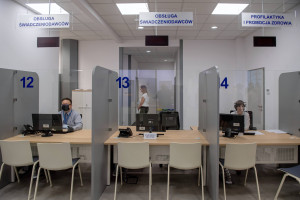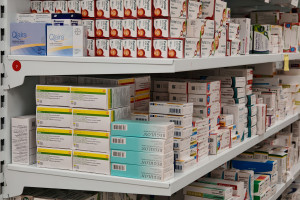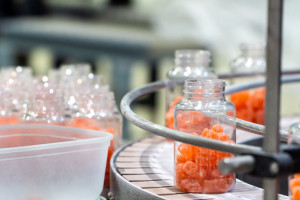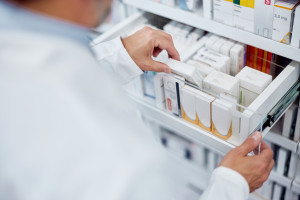Chief Pharmaceutical Inspector: In pharmacies, a pen and a piece of paper are used to monitor temperature

- The Ministry of Health has prepared a draft amendment to the regulation on the basic conditions for running a pharmacy
- It proposes a procedure for monitoring the storage conditions of medicines and the procedure to be followed in the event of a breach of these conditions, as well as a new obligation to conduct and document a risk analysis in the event of such a breach, in particular a significant exceedance of the permissible temperature range.
- - These proposals will not destabilize the work of pharmacies in any form. On the contrary, they will increase patient safety through proper storage of medicines and protect pharmacies from losses in the event of the need for disposal - assures Łukasz Pietrzak, Chief Pharmaceutical Inspector
We return to the subject of drug storage conditions and the draft amendment to the regulation on basic conditions for running a pharmacy. It proposes removing the requirement for 24-hour monitoring of temperature and humidity in pharmacy premises and humidity in refrigeration equipment.
At the same time, the Ministry proposes a procedure for monitoring the storage conditions of medicines and the procedure to be followed in the event of a breach of these conditions, as well as a new obligation to conduct and document a risk analysis in the event of such a breach, in particular a significant exceedance of the permissible temperature range.
In refrigeration equipment used to store medicines, the pharmacy must provide temperature monitoring equipment with a calibration certificate issued by an accredited calibration laboratory and a system for recording temperature and notifying about exceedances of temperature parameters.
On July 5 this year, we wrote about the position of the Supreme Pharmaceutical Council on the draft regulation: Refrigerators for detention, patients will not receive medicine. Will the regulation paralyze pharmacies?
- These proposals will not in any way destabilize the work of pharmacies or reduce the availability of medicines for patients. On the contrary, they will prevent unnecessary losses of medicines and increase patient safety - assures Łukasz Pietrzak.
He adds that currently, at every stage of drug turnover, in accordance with good distribution practice, the drug is monitored in terms of storage conditions, not only in refrigeration equipment, but also in the storage space and transport. However, in most cases, automatic monitoring ends at the time of delivery of the drugs to the pharmacy.
- In some pharmacies, only a pen and a piece of paper are still used to monitor the temperature in the refrigerator, on which readings are most often taken on working days.
Theoretically, it could happen that on a weekend or a holiday, the temperature would change significantly, and then return to its previous state at the time of reading after a few days. No one would even know that the drugs could have been stored in improper conditions during that time.
- Thanks to the proposed changes, we will have full knowledge of how the medicine was stored and certainty that these conditions were in line with the manufacturer's recommendations - emphasizes the Chief Pharmaceutical Inspector.
SMS: Attention, refrigerator failureThere can be many situations when the temperature is exceeded: a refrigerator failure, a power outage, an overload of the electrical network, or even an inadvertent failure to close the door of the refrigeration device.
As the head of the pharmaceutical inspection adds, the monitoring is not intended to expose the refrigerator "to arrest":
- It is exactly the opposite - it is used to prevent temperature deviations and problems with access to thermolabile drugs. It is enough to set appropriate alarm thresholds for temperature, and the system will immediately and automatically send a warning (usually in the form of a text message) that the temperature in the refrigerator has risen or fallen too much.
- This allows you to take action in advance. Sometimes it is enough to close the refrigerator door, and in extreme cases, transfer the medicines to an efficient cooling device. This is real protection of thermosensitive products from the need to dispose of them, pharmacies from losses, and patients from lack of access to medicines such as insulin, vaccines or some hormones. All the more so because the cost of purchasing a device to monitor refrigerators is an expense many times lower than the value of the medicines stored in them - emphasizes Łukasz Pietrzak.
Modern refrigerators used in pharmacies have high thermal inertia, which ensures maintaining appropriate conditions during normal operation of the pharmacy, even when its doors are opened frequently.
- According to the draft amendment, exceeding the storage temperature should be described and analyzed based on the knowledge and experience of the pharmacist and the documentation regarding individual drugs. However, it should be emphasized that the temperature monitoring system significantly reduces the risk of such situations, as it provides information and time to take preventive measures . An important issue is that the draft regulation leaves the decision to the pharmacy manager, and this flexibility in this regard is justified, because each case of exceeding the temperature is different and should be considered individually. Pharmacists are experts on drugs and are best able to assess whether the deviation is significant and how to proceed in a given situation - he explains.
The primary source of information is the Summary of Product Characteristics and drug stability data, which can be obtained directly from the marketing authorisation holder.
The Inspector reminds that at the end of 2022, an amendment to the regulation on the basic conditions for running a pharmacy came into force, which imposed the obligation to fully monitor all rooms and devices in which medicines are stored. The regulations were to come into force on 4 December 2025. Recent analyses of the degree of adaptation of pharmacies to the new regulations have shown that only 10 percent of entities meet these requirements.
- In order to avoid paralysis of their work, it was proposed to abandon the installation of devices for 24-hour monitoring of temperature and humidity in pharmacy premises. However, the requirement for refrigerators was maintained. This is justified due to the nature of the preparations stored in them, and therefore the safety of patients and the effectiveness of pharmacotherapy - explains GIF.
Copyrighted material - reprint rules are specified in the regulations .
rynekzdrowia










